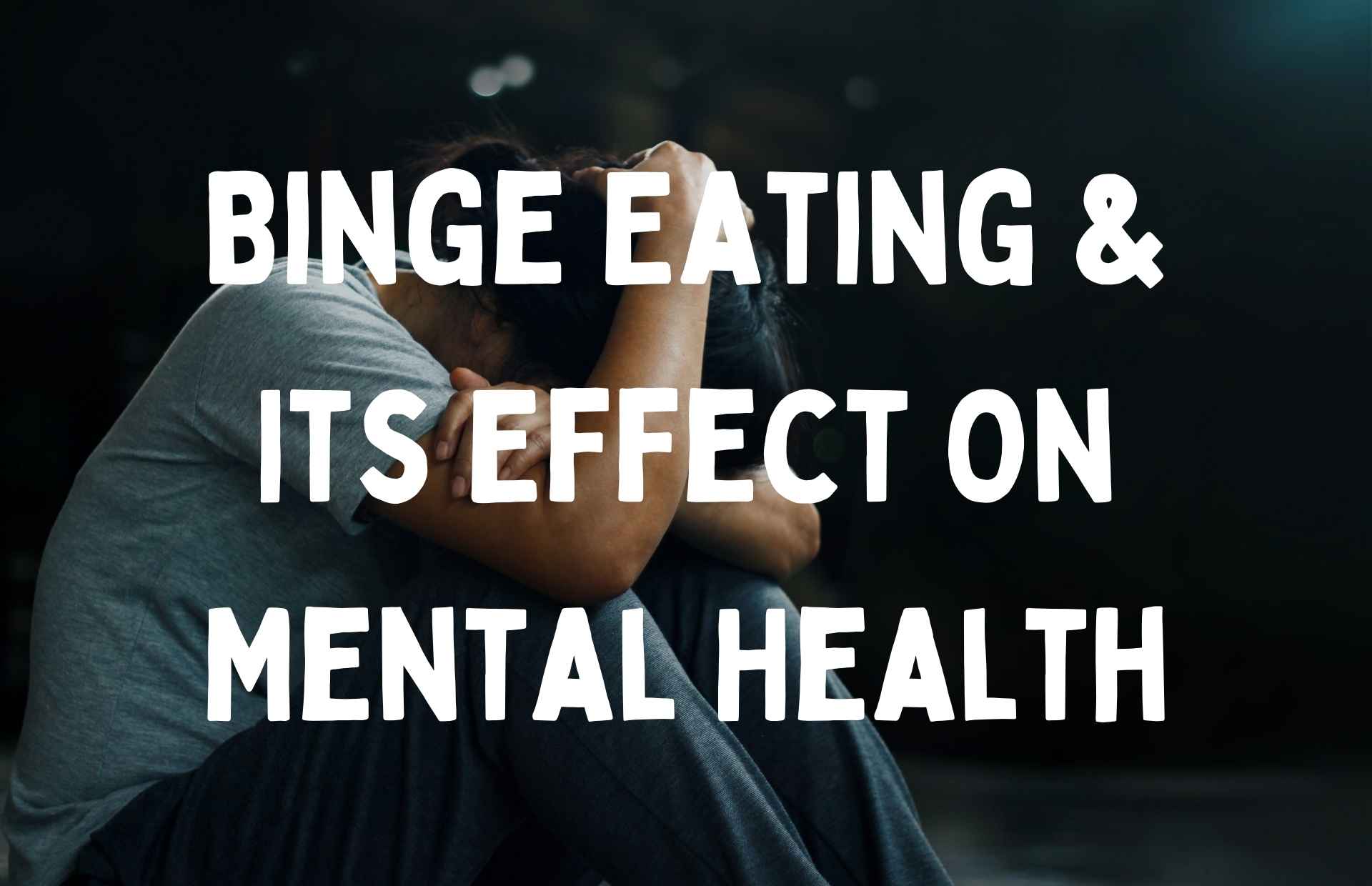

Binge Eating And Its Effect On Mental Health
Binge eating is not just about those late-night snacks or finishing a tub of ice cream after a bad day. For many people, it?s a struggle that goes beyond food, and the mental toll it takes is far more significant than the extra calories. Binge eating can feel like a never-ending cycle, affecting not only your body but also your mind and self-esteem.
So, what is binge eating doing to your mental health, and how can you stop it? In this post, we?ll break it all down. You?ll understand the emotional rollercoaster, explore the impact of binge eating on mental health, and?most importantly?discover strategies to break the cycle.
What Is Binge Eating Disorder (BED)?
Binge eating disorder (BED) involves consuming large amounts of food in a short period while feeling out of control. It?s not just an occasional overindulgence but a regular occurrence, leading to significant emotional distress. Unlike other eating disorders, there?s no purging or extreme dieting afterward?it?s a cycle of bingeing, followed by guilt and shame.
BED is the most common eating disorder, affecting millions of people globally. It can have profound effects on mental health, contributing to anxiety, depression, and other emotional struggles.
How Binge Eating Affects Mental Health
1. Guilt and Shame: The Mental Fallout
After a binge episode, the emotional weight can hit hard. It?s not just about feeling full; it?s about feeling like you?ve lost control. This can lead to overwhelming guilt and shame, which only deepens the bingeing cycle. You might start to ask yourself, ?Why did I do this? What?s wrong with me??
The cycle of self-blame can feel like a treadmill you can?t get off. These feelings can seriously affect self-esteem, leaving you feeling less and less confident as the binges pile up. The constant self-blame and shame can lead you down a dark path ? slowly depleting your self-confidence until you reach a point where you don't have any confidence in yourself and your control.
But, self-blame won?t solve anything, and we?ll get into some strategies soon that can help with that.
2. Anxiety and Depression: Feeding the Cycle
Many people with binge eating disorder also struggle with anxiety and depression. Food often becomes a coping mechanism ? a way to temporarily soothe overwhelming emotions. But the relief is short-lived, and after the binge, the negative feelings often come rushing back, sometimes stronger than before.
This back-and-forth between food and emotions creates a vicious cycle. Anxiety fuels binge eating, and binge eating fuels more anxiety. It?s a loop that?s tough to break without the right tools.
3. Body Image and Self-Esteem Issues
It?s no secret that binge eating can lead to weight gain. And in a world where body image is so closely tied to self-worth, this can be devastating. Those struggling with BED often feel dissatisfied with their bodies, which only increases feelings of inadequacy. You might avoid social situations, feel embarrassed about your appearance, or even isolate yourself.
Low self-esteem and a negative body image can exacerbate mental health problems, feeding into depression and anxiety. It?s important to remember, though, that self-worth isn?t about appearance?and learning to break free from these thoughts can be part of healing.

4. Emotional Numbing: Escaping Through Food
Binge eating can be a way of numbing emotions. When life feels overwhelming, food can provide temporary relief from stress, anger, or sadness. During a binge, it might feel like you?re on autopilot, detached from your feelings. But once the episode ends, those emotions come flooding back, often worse than before.
This avoidance behaviour can leave you feeling even more disconnected from your emotions and from others, making it harder to engage with life in a meaningful way.
Strategies to Break Free from the Cycle
While the mental health impact of binge eating is profound, it?s important to know that recovery is possible. There are plenty of strategies to help you regain control over your relationship with food and, most importantly, improve your mental well-being.
1. Therapy: A Game-Changer
Therapy, especially Cognitive Behavioural Therapy (CBT), is one of the most effective treatments for binge eating disorder. CBT focuses on understanding the thought patterns and triggers that lead to binge eating and helps you develop healthier coping mechanisms. It?s not just about stopping the binges?it?s about addressing the emotions behind them.
For those who use binge eating to cope with intense emotions, Dialectical Behaviour Therapy (DBT) can be a useful approach. DBT teaches you how to regulate emotions, tolerate distress, and practice mindfulness.
2. Building a Support Network
Let?s face it ? facing binge eating alone can feel impossible. Surrounding yourself with people who understand what you?re going through is crucial. Whether it?s friends, family, or an online community, sharing your struggles can lift a huge weight off your shoulders.
There are also support groups specifically for binge eating. These groups provide a safe space to connect with others who know exactly what you're going through and can offer advice, encouragement, and support.
The Undiet Community is perfect for this. When you join this community, you'll be around an amazing group of other women on a journey similar to yours. You'll also get support from expert dieticians and nutritionists who specialise in binge eating recovery.

3. Mindful Eating: Reconnecting with Your Body
Mindful eating is about slowing down and paying attention to what you?re eating, how you?re eating, and why. It helps you reconnect with your body?s natural hunger and fullness cues, reducing the urge to binge.
Start by noticing the flavours, textures, and smells of your food. Take your time and eat without distractions. Put your knife and fork down between every mouthful. The goal is to tune in to your body rather than zoning out, which is often the case with bingeing.
4. Managing Stress Without Food
If stress is one of the main triggers for binge eating, finding healthier ways to cope is essential. Developing new coping strategies can help you manage stress, anxiety, and other emotions without turning to food. Here are some ideas:
- Exercise: A natural stress reliever that also boosts mood.
- Journaling: Writing about your feelings can help you process emotions.
- Meditation: Helps calm your mind and centre your thoughts.
5. Challenging Negative Thoughts
A major aspect of mental health and binge eating is the negative thought patterns that fuel the disorder. These thoughts can range from ?I?m not good enough? to ?I?ll never get control of my eating.? The key is to challenge these thoughts and reframe them.
Using cognitive behavioural techniques, you can start to identify unhelpful thoughts and replace them with healthier alternatives. For example, instead of thinking, ?I?m a failure for bingeing,? try thinking, ?I had a difficult day, and I used food to cope. I can work on healthier ways to handle stress.?
This shift in thinking can reduce guilt and shame, improving your mental state over time.
6. Professional Help: When It?s Time to Seek Support
While some strategies can be practised on your own, binge eating disorder is often best addressed with the help of a professional.
Registered dietitians and nutritionists can help create a personalised recovery plan that addresses both the emotional and physical aspects of binge eating.
In some cases, medications may be prescribed to help manage underlying issues like anxiety or depression. If you?re feeling overwhelmed, seeking professional help can be the best step you take toward healing.
At The Undiet Company, we offer a variety of different services ? from one-off consultations with a qualified nutritionist or dietician, to in-depth 12-week programs. All our services are specifically designed to help women stop binge eating and take back control over food.

7. Building Healthy Routines
Binge eating often thrives in chaos. If your eating habits, sleep schedule, and exercise routine are all over the place, it?s harder to break free from the cycle.
One way to improve your mental health and reduce binge eating is to establish healthier routines.
- Meal planning: Structure your meals to include a balance of proteins, healthy fats, and complex carbohydrates. Regular meals can help prevent extreme hunger, which can trigger a binge. Be sure to include 'binge' foods (i.e., the foods you always crave) within these meal plans so you can teach your body to eat them in moderation.
- Sleep hygiene: Poor sleep can contribute to stress and overeating. Make sure you?re getting enough rest to support both your mental and physical health.
- Exercise: While exercise should never be used as a form of punishment for bingeing, regular physical activity can help boost your mood, reduce stress, and improve body image.
Consistency is key. Building a routine that supports your mental health can help reduce the likelihood of binge eating episodes.
The Role of Self-Compassion in Recovery
Recovering from binge eating is a journey, and it?s easy to be hard on yourself during the process. But one of the most important aspects of healing is self-compassion. Research shows that people who treat themselves with kindness and understanding, rather than criticism, are more likely to make positive changes.
Practising self-compassion means recognising that you?re not alone ? many people struggle with disordered eating, and it doesn?t make you a failure. Instead of focusing on past mistakes, treat every day as a new opportunity to make healthier choices. This mindset shift can significantly improve mental health and reduce the urge to binge.
Practical steps for practising self-compassion:
- Replace negative self-talk with kinder, more constructive thoughts.
- Engage in activities that make you feel good about yourself, such as hobbies or exercise.
- Celebrate small victories in your recovery journey.
Conclusion: You Are More Than Your Binge Eating
It?s important to remember that binge eating doesn?t define you. Yes, it can take a toll on your mental health, but with the right strategies and support, recovery is possible. Breaking the cycle of binge eating is about more than just food ? it?s about healing your mind and learning new ways to cope with emotions.
Whether through therapy, mindfulness, or professional help, there are many paths to recovery. Be patient with yourself, and remember that small steps can lead to big changes over time.